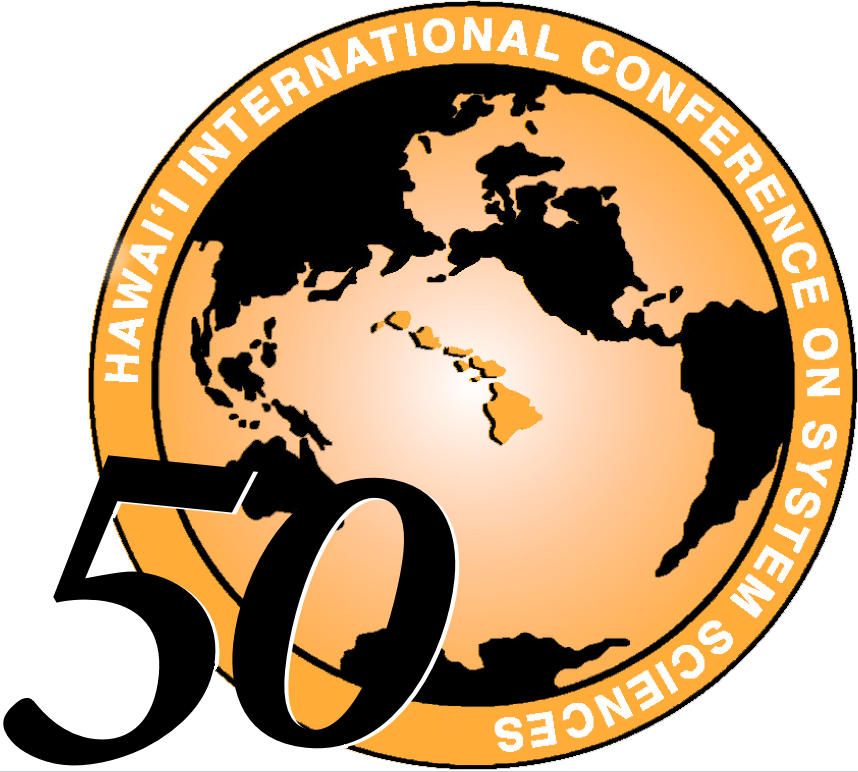HICSS - 50 E-Government Track
50th Hawaii International Conference on System Sciences
January 4-7, 2017 - Hilton Waikoloa Village, Big Island, HI, USA
Overview
Minitracks
Symposia and Workshops
Other Links
Government Services and Information



Minitrack Description
Improvements in technology have a significant impact on the way government agencies interact with their constituents. This mini-track seeks research papers and practitioner reports addressing citizens' expectations and acceptance of e-government services across government levels and branches, success factors for e-government services development and implementation, value assessments of e-government services, and methodologies, techniques, and tools for service composition. We are particularly interested in the characteristics, development, implementation, uses, and evaluation of e-government services and systems.
E-government services pose numerous challenges in terms of interoperability of services, design of services, optimization of process chains, identification and assessment of the value-chain of services, cross-organizational service chains, workflow support of e-services, integration of internal IT support, G2G and G2C e-services, outsourcing of services, digital preservation, electronic records management, etc. Research to guide the development, management and evaluation of e-government services is in great demand in this important and rapidly growing domain.
Minitrack topics include, but are not limited to:
- E-services for an aging population
- IT development and project management in the public sector
- Citizens' expectations and acceptance of e-government services across government levels and branches
- Success factors for e-government services development and implementation
- Value assessment of e-government services
- Methodologies, techniques, and tools for service composition
- E-government services provision in developing countries
- Comparative and/or trans-national e-government services
- Trust perception of the e-government services, and trust dynamics among individuals, groups, and organizations in the value chain of service provision
- Challenges and/or recommendations for increasing citizen trust of e-government
- Impacts of e-government services
- Political, legal, organizational, and technological barriers to e-government diffusion
- Opportunities and challenges of e-government mobile services
- Business process analysis, value-chain analysis and change requirements for e-government services
- IT-based procedures, workflow support, protocols, and schemes used for government services
- Historical assessment of e-government services
- Access to governmental documents and records, including legal, policy, and technical implications, program models, and case studies
- Electronic record management and archiving standards
- Case studies on innovative services in various branches of the public sector, such as e-services in the administrative, judicial, executive, defense, health care, education, etc.
- Service modeling, optimization and analysis
- E-services in public libraries
- E-government and the arts
More information on the mini-track chairs:
Ludwig Christian Schaupp, PhD, is an Associate Professor in the Department of Accounting in the College of Business and Economics at West Virginia University. His primary research interests include e-government adoption, and website success metrics. He has published in several top-tier journals including Communications of the ACM, Journal of Information Systems, and Information Systems Frontiers.
Jay P. Kesan, Ph.D., J.D., is Professor and H. Ross and Helen Workman Research Scholar and Director of the Program in Intellectual Property and Technology Law at the University of Illinois. His academic interests and writings are in the areas of digital government, cyberlaw, patent law, entrepreneurship, and law and technology. He is a registered patent attorney and received his J.D. summa cum laude from Georgetown University. He also has a Ph.D. in Electrical and Computer Engineering from the University of Texas at Austin and worked for several years as a research scientist at the IBM T.J. Watson Research Center in New York. For a more complete bio, please see http://www.jaykesan.com
Luis Felipe Luna-Reyes is a Professor of Informatics at the University at Albany in Albany, NY. He holds a Ph.D. in Information Science from the University at Albany, and he is also a member of the Mexican National Research System. His research focuses on electronic government and on modeling collaboration processes in the development of information technologies across functional and organizational boundaries. His research interests are related to areas such as inter-organizational collaboration, information sharing, success of government-wide Web sites, and information policy to promote economic exchange in the NAFTA region. He is the author or co- author of articles published in Government Information Quarterly, European Journal of Information Systems, International Journal of Electronic Government Research, Gestión y Política Pública, and System Dynamics Review, among others.
Co-Chairs
Ludwig Christian Schaupp
(Primary Contact)
West Virginia University
College of Business and Economics
314 Business and Economics Bldg, P.O. Box 6025
Morgantown, WV 26506-6025
Phone:+1-304-293-6524
Fax: +1-304-293-6035
Email: Christian.schaupp@mail.wvu.edu
Jay P. Kesan
University of Illinois at Urbana Champaign
College of Law
504 E. Pennsylvania Ave.
Champaign, Ill 61820, USA
Phone +1-217-333-7887
Fax: +1-304-293-6035
Email: kesan@illinois.edu
Luis F. Luna-Reyes
University at Albany, SUNY
College of Engineering and Applied Sciences
Informatics, BA 312
1400 Washington Ave
Albany, NY 12222, USA
Phone: +1-518-442-3142
Email: lluna-reyes@albany.edu
